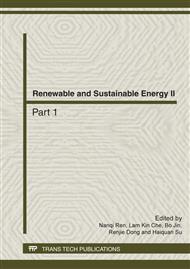[1]
Z.Y. Sun, F.S. Liu, X.H. Liu, B.G. Sun, and D.W. Sun: Int. J. Hydrogen Energy Vol. 37 (2012), pp.664-681.
Google Scholar
[2]
K. Yuan and W.R. Lin: Int. J. Hydrogen Energy Vol. 35 (2010), pp.3110-3113.
Google Scholar
[3]
National Bureau of Statistics of China: China statistical yearbook 2011 (China Statics Press, Beijing 2011).
Google Scholar
[4]
Information on http://www.stats.gov.cn/was40/gjtjj_en_detail.jsp?channelid=1175
Google Scholar
[5]
International Energy Agency: CO2 emissions from fuel combustion highlights 2010 edition (IEA, Paris 2010).
Google Scholar
[6]
International Energy Agency: How the energy sector can deliver on a climate agreement in Copenhagen (IEA, Paris 2009).
Google Scholar
[7]
S.D. Xie, Y.H. Zhang and X.Y. Tang: Res. J. Environ. Sci. Vol. 13 (2002) pp.22-25.
Google Scholar
[8]
H. Yi, J. Hao and X. Tang: Energy Policy Vol. 35 (2007) pp.907-915.
Google Scholar
[9]
X. Yan and R.J. Crookes: Prog. Energy Combust. Sci. Vol. 36 (2010) pp.651-676.
Google Scholar
[10]
X. Ou, X. Zhang and S. Chang: Energy Policy Vol. 38 (2010) pp.3943-3956.
Google Scholar
[11]
Information on http://www.cefs.ac.cn/20110122.pdf
Google Scholar
[12]
N. Zeng, Y.H. Ding, J.H. Pan, H.J. Wang and J. Gregg: Science Vol. 319 (2008) pp.730-731.
Google Scholar
[13]
X.M. Ou, X.L. Zhang and S.Y. Chang: Energy Policy Vol. 38 (2010) pp.406-418.
Google Scholar
[14]
BP: BP statistical review of world energy June 2011 (BP, London, 2011)
Google Scholar
[14]
H. Hao, H.W. Wang and M.G. Ouyang: Energy Policy Vol. 39 (2011) pp.1016-1021.
Google Scholar
[15]
M.F. Hordeski: Alternative fuels: the future of hydrogen (Taylor & Francis Group, Boca Raton, 2008).
Google Scholar
[16]
C.A. Grimes, O.K. Varghese and S. Ranjan: From hydrocarbons to hydrogen: towards a sustainable future (Springer, New York, 2008).
Google Scholar
[17]
X. Deng, H. Wang, H. Huang and M. Ouyang: Int. J. Hydrogen Energy Vol. 35 (2010) pp.6475-6481.
Google Scholar
[18]
F. Shangguan, X. Li and C. Zhang: Energy for Metallurgical Industry Vol. 28 (2009) pp.3-8.
Google Scholar
[19]
Information on http://www.autoinfo.gov.cn/autoinfo_cn/zjsd/zjzx/zy/webinfo/2011/04/1299552 421616064.html
Google Scholar


